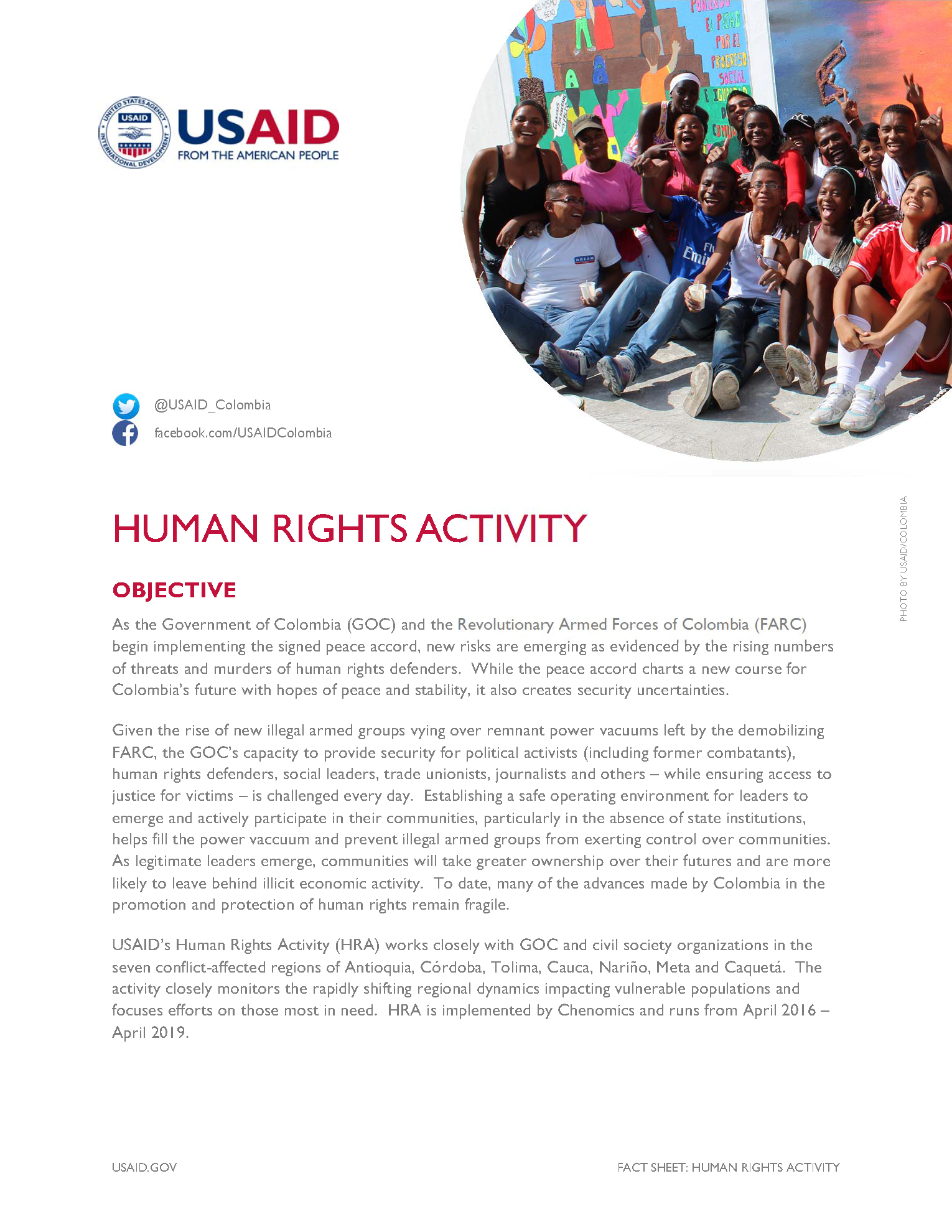DRG - Human Rights Activity (HRA) ![]() (pdf - 162k)
(pdf - 162k)
OBJECTIVE
As the Government of Colombia (GOC) and the Revolutionary Armed Forces of Colombia (FARC) begin implementing the signed peace accord, new risks are emerging as evidenced by the rising numbers of threats and murders of human rights defenders. While the peace accord charts a new course for Colombia’s future with hopes of peace and stability, it also creates security uncertainties.
Given the rise of new illegal armed groups vying over remnant power vacuums left by the demobilizing FARC, the GOC’s capacity to provide security for political activists (including former combatants), human rights defenders, social leaders, trade unionists, journalists and others – while ensuring access to justice for victims – is challenged every day. Establishing a safe operating environment for leaders to emerge and actively participate in their communities, particularly in the absence of state institutions, helps fill the power vaccuum and prevent illegal armed groups from exerting control over communities. As legitimate leaders emerge, communities will take greater ownership over their futures and are more likely to leave behind illicit economic activity. To date, many of the advances made by Colombia in the promotion and protection of human rights remain fragile.
USAID’s Human Rights Activity (HRA) works closely with GOC and civil society organizations in the seven conflict-affected regions of Antioquia, Córdoba, Tolima, Cauca, Nariño, Meta and Caquetá. The activity closely monitors the rapidly shifting regional dynamics impacting vulnerable populations and focuses efforts on those most in need. HRA is implemented by Chenomics and runs from April 2016 – April 2019.
COMPONENTS
Promoting a Culture of Human Rights
HRA promotes a culture of human rights by strengthening the capacities of the GOC, civil society, and Colombian citizens’ to better protect and promote human rights. The activity places special emphasis on human rights efforts in conflict-affected rural areas, while also supporting some national policies and programs. HRA concentrates on policy reform and peace accord implementation as they relate to the prevention and protection of human rights. Activities include a wide range of public awareness campaigns and training activities tailored for each beneficiary group, including public officials, the media, activists and students.
Preventing Human Rights Violations
HRA helps the GOC and civil society prevent violations and to respond effectively to violations when prevention fails. Specifically, the activity supports the design and implementation of public policy to improve the capacity of authorities and communities in regards to risk analysis and prevention measures. HRA also helps develop prevention and self-protection mechanisms for at-risk communities, including strengthening law enforcement’s capacity to interact with vulnerable populations in target regions.
Responding to Human Rights Violations
HRA assists GOC institutions and civil society to address the needs of groups disproportionately affected by human rights violations. These groups—including victims of gender-based violence—have become increasingly vulnerable in the shifting context of the post accord reality.
RESULTS
- Trained 1,833 human rights defenders.
- Trained 331 public officials from 20 municipalities in prevention of human rights violations.
- Trained 131 public officials from six departments in GBV prevention and response.
- Supported 25 prevention working-groups.
- Trained 60 journalists in prevention and protection.
- Supported 16 gender working-groups.
- Awarded eight grants to civil society organizations to strengthen organizational capacity for the promotion of human rights.








Comment
Make a general inquiry or suggest an improvement.